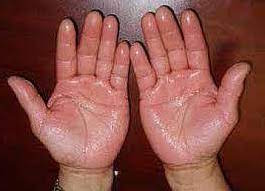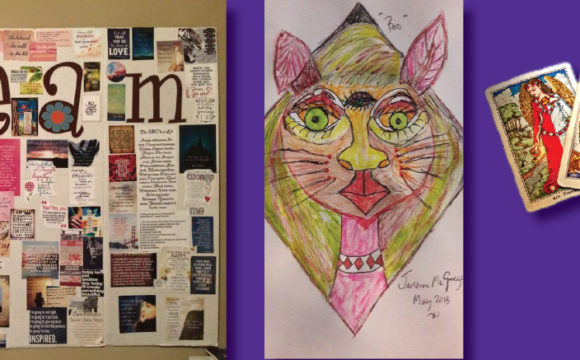 Whether your palms are mildly moist, or if you suffer from the more extreme condition of palmar hyperhidrosis, a chirologist will know that you experience life in terms of feelings. You have enormous emotional sensitivity to moods and vibes, and you need a loving, kind environment where there is co-operation, not conflict. Crudeness and vulgarity are loathed, discord hurts you, your ideals are strong, and you are more than likely caring and considerate about how others are feeling.
Whether your palms are mildly moist, or if you suffer from the more extreme condition of palmar hyperhidrosis, a chirologist will know that you experience life in terms of feelings. You have enormous emotional sensitivity to moods and vibes, and you need a loving, kind environment where there is co-operation, not conflict. Crudeness and vulgarity are loathed, discord hurts you, your ideals are strong, and you are more than likely caring and considerate about how others are feeling.
When you arrive for a Chirology reading we shake hands, and from this initial touch I determine your skin texture. A distinction is made between those who present with a temporary or slight moistness of the palmar surface, and those who suffer from palmar hyperhidrosis, a disorder characterised by excessive sweating of the hands. I may ask “are your hands often, or always moist?” Sometimes sweaty palms signify a temporary emotional crisis (for example, a recent shock, or divorce, or substance withdrawal) and in time, with the integration and healing of the impact of the situation, the perspiring stops.
Moist palms aspect the water skin type. Some descriptions that define this skin type are: moist, soft, fleshy, podgy, pale and mostly warm, although some water skin feels cold and clammy. When running the fingertips over the palmar surface, we notice that, besides the moisture, the skin ridges cannot be felt, and that the pores are fine and almost invisible.
Rules of conduct in society define a firm, dry handshake as signifying a trustworthy and confident type, and a moist, damp or clammy handshake to generally indicate anxiety, nervousness, vulnerability and stress. Much of your success in life depends on how other people perceive you, and the negative effects of a condition over which you have no control inhibits both social and professional aspects of life. Sweaty hands are interpreted as a sign of insecurity and lack of self-confidence. This can prove disastrous in business, for example, when shaking results in literally wetting the other person’s hands and is embarrassing. Sweaty palms also affect intimate relationships and increase the tendency to withdraw.
Sweating often occurs spontaneously, without there necessarily being any outside stimulus such as emotional distress, although the condition is aggravated by stress. There may be a constant need to wipe your hands, and this interferes with grasping of objects. Writing, putting on makeup, handling documents or money, typing etc are stressful, which aggravates the situation further.
Certain medical treatments may eliminate palmar hyperhidrosis. Oral medications, astringent ointments and antiperspirants may help to dry the sweat glands. A treatment of electrical stimulation, called iontophoresis, which requires the hands to be placed in water though which an electrical current is passed, “stuns” the sweat glands. This treatment can decrease the secretion of sweat for temporary periods.
A more recent treatment is the injection of botulinum toxin (Botox) into the area of excessive sweating. This reduces the transmission of the nerve impulses to the sweat glands resulting in decreased sweating, but repeated follow-up injections are required to maintain dryness.
When less invasive medical treatments fail, severe cases of heavy hand sweating can be cured surgically. Sweating is controlled by the sympathetic nervous system. The Thoracoscopic Sympathectomy entails clamping, removing or cauterising the appropriate segments of nerve and ganglion near the back, top and inside the chest.
Young people with this condition are advised to avoid invasive treatment, as I know of two cases where hyperhidrosis spontaneously retracted as their confidence and emotional maturity developed.
In 5 Element Chirology sweaty palms show that your water element is rampant and out of control. Whether this is a slight bother, or a challenging affliction needing medical intervention, healing can be aided by becoming more conscious of two aspects of your soul’s needs. One is to activate the yang, drying fire element within yourself, for example to engage in a dynamic sport or martial art, and to increase your commitment to creative endeavour, all of which will help manage your underlying anxiety. The other is to use the water element more consciously, by swimming and bathing and applying gentle, forgiving nurturing to yourself. Relaxation methods, meditation and quietly attuned visualizations aimed at comforting your acute levels of sensitivity are advised.
Unredeemed aspects of your water skin personality are worthy of mention. Water skin types are acutely sensitive therefore are also easily offended, but if you have the courage and honesty to reflect upon the reasons for your unconscious shadow and your negative character traits, much self awareness can be gained. These are: the tendency toward egocentric self absorption, manipulative attention seeking, dependency, neediness, moodiness and perhaps even a complete disinterest in what others are experiencing. When provoked, your emotional responses can also be very volatile, expressed in an uncontrolled rage and temper that may frighten and amaze.
Our skin is a membrane between ourselves and the outer world. We experience life through our skin. Chirology defines four skin types, and each corresponds to an element. The elemental quality of your skin represents your element of impression (how we receive) and gives information as to the type of environment to which we are best suited and attuned.
Lastly, any form of empathic emotional encouragement from therapists, family and friends can help you to manage your condition.
Jennifer Hirsch
Cell: +27 082 415 0653








